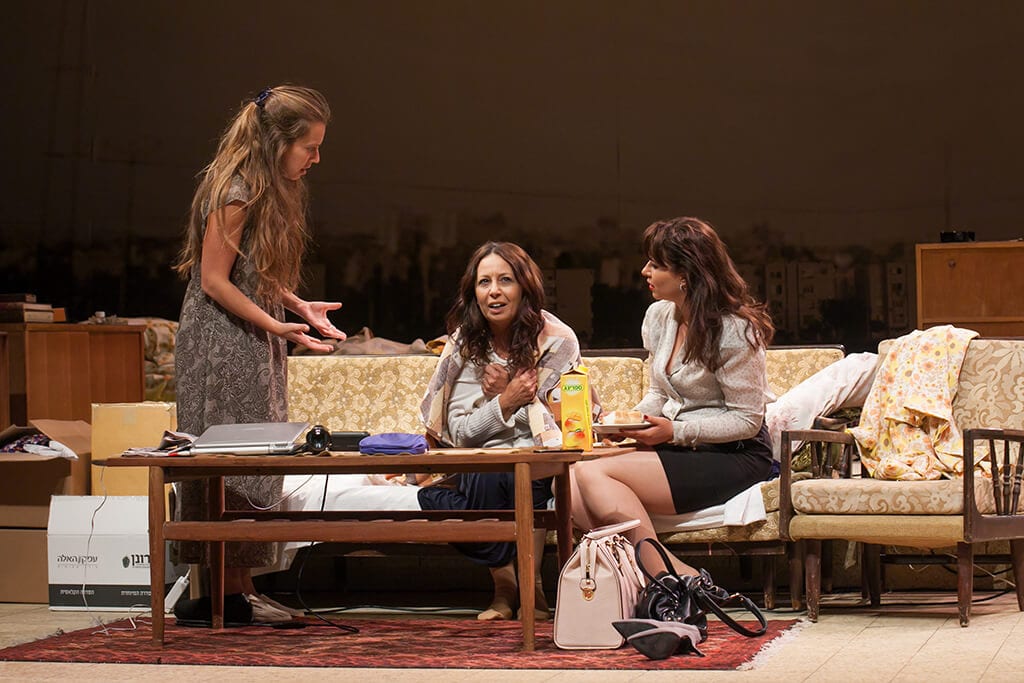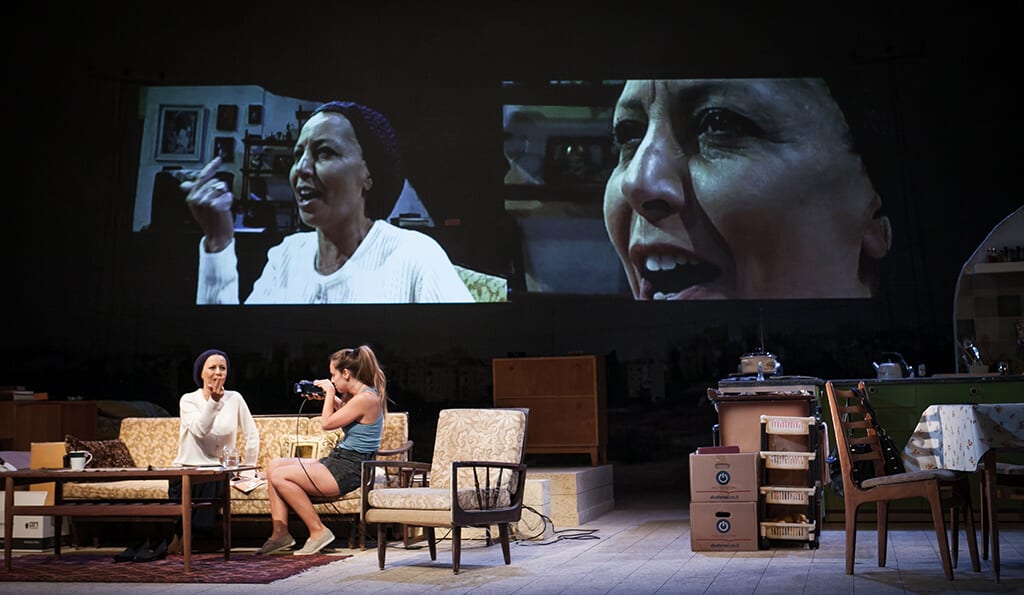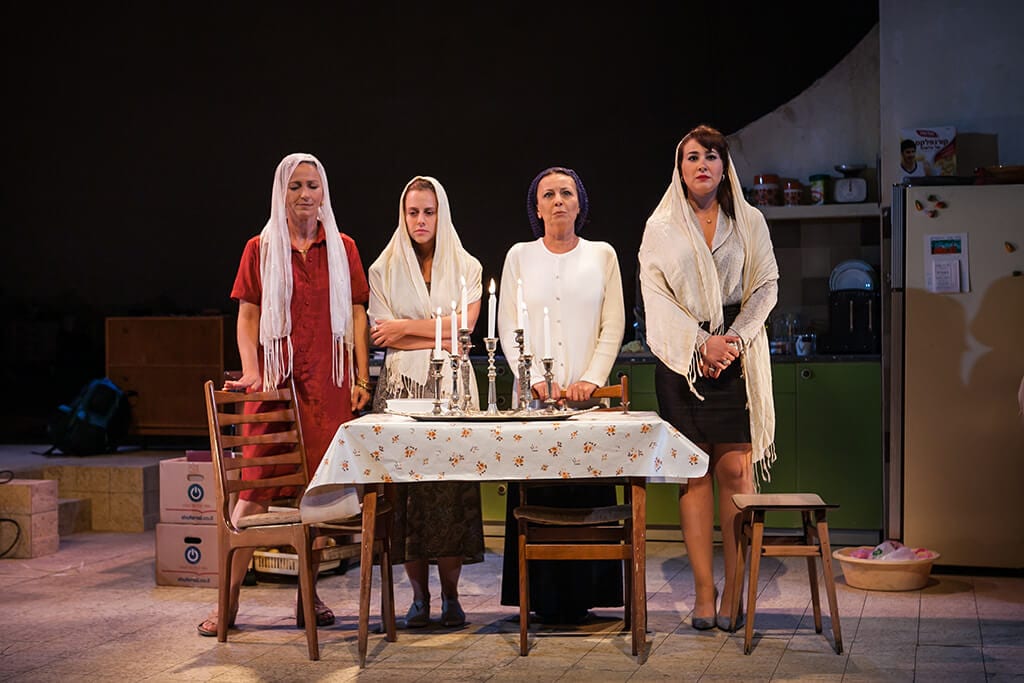I was calm when I entered the theatre hall where ‘Atonement’ (reference to Yom Kippur), was performed, but my feeling quickly changed to a mixture of irritation, amusement, relief and even tears; there was no room for escaping full concentration – the show was too fascinating. Everyone seemed to be captivated by the emotional adventure that occurred on stage. And this despite the fact that the setting in this play does not change at all, and the most sophisticated technological action occurs when Amira (Yael Eitan) takes with her camera a video which is simultaneously displayed on the wall facing the audience. Also, the cast includes only four actors. Yet from these simple elements, director Kfir Azoulay created an excellent, authentic-feeling play.
Throughout the ninety five minutes and with no interval, ‘Atonement’ challenges the audience. Without providing too many spoilers, I will reveal that the conflict spins around the vanishing of the old mother of the four sisters from her “Amidar” apartment, namely a government-controlled subsidised housing unit for new immigrants who arrived in the young and poor country of Israel. The Moroccan descent of the characters resulted in many cross-cultural and integration difficulties in the new country. The show focusses on a problematic chapter in Israel’s social history, when newcomers of Moroccan descent were facing cultural discrimination due to misunderstandings of their culture by immigrants of European origin, who constituted the majority of the population at that time. Israel is, in many contexts, still divided in this way as memories of the social and even racial discrimination between the different diasporas sharing the same religion still prevail. Hannah Azoulay-Hasfari, a distinguished Israeli actor who wrote the script back in 2000, is telling, with strong emotions, the story of the Moroccan immigrants who include her family.
The set is quite striking, because it reflects a family residence; and specifically the environment of the peripheral and rather poor development city of Netivot in the south of Israel. Because of the mysterious disappearance of their mother, Amira’s sisters gather there; Malka (Orly Tobaly), an unhappily married woman whose life centers around the welfare of her kids, being a housewife and a wild woman to her husband; Evelin (Evelin Hagoel), an Orthodox religious woman who displays an obsession with her children, and with religious laws and conservatism; the youngest sister Amira, a sizzling personality who moved from the periphery to Tel Aviv in order to fulfill herself in cinematography studies but fails due to mental issues; and her middle sister Fannie (wonderfully played by Maayan Turgeman), who became a wealthy businesswoman in Silicon Valley, after being kicked away from home at sixteen years old because of her licentiousness. The four sisters reveal their hidden emotions and loads of bitterness towards their mother and each other. The meeting occurs during Yom Kippur, the holiest day of the year in Judaism reflecting atonement and repentance and symbolized by fasting, prayer and the plea for compassion from humans and God. The absurd is manifested by the contrast between the message of the holy day (Yom Kippur) and the loads of anger they express. This contrast is exposed in a dizzying rhythm, sometimes too swift; and by the end of the show, we can figure out where the mother is and why, without her absence, the girls can finally achieve mutual connection. In my opinion, the characters are authentic, except that Fannie’s sexuality may be too banal. But the acting, humor breaks, and tension- are all well-done.
At last, the broken family can arrive at unification. And not only does the play dare to portray the situation of a family that functions better without a mother, it also shows the effects of cultural conflicts continuing into the second and third generations after immigration. And the play also carries a message about the way in which a director can achieve a powerful outcome using sheer minimalism as well as a perfect cast.
ההצגה ‘סליחות’ מצליחה לעשות את זה. ‘זה’, זו רכבת ההרים האמוציונלית שרוצה הפרט לעבור כאשר הוא ניתק מחייו ונכנס לחלל התאטרון. בשילוב ארבע שחקניות בלבד, סט בלתי משתנה ו’טריק’ טכנולוגי יחיד (הקרנת סרט שמצולם על הבמה במצלמת וידאו פשוטה, בו בעת), יוצר כפיר אזולאי, במאי ההצגה, תוצר איכותי מאוד, המעביר את הקהל סערות של צחוק, בכי, חמלה וצער. אף שהשיח הנוגע לצביון העלייה המרוקאית ארצה, על כל גליה ואופניה, הנו נפוץ – חנה אזולאי הספרי ממנפת את הנתון בתסריט אישי ומחממת לב. היא מצליחה לפרוס לעיננו מרבד מגוון של נשים, צורות חיים ואישיויות.
מבלי להרוס בספולרים, אגיד שהעלילה נעה סביב העלמות האם מדירת ה’עמידר’ שלה. בנותיה – מהקטנה לגדולה: אמירה (יעל איתן), פאני (מעיין תורג’מן המצוינת), אוולין (אוולין הגואל) ומלכה (אורלי טובלי), מתכנסות בבית הנטוש וחוככות בדעתן מה לעשות. רצף של ויכוחים לגבי פתרון התעלומה, מתובל בהערות וטענות, חושף לעיננו בהדרגה את סיפורה של כל אחת מבנות המשפחה. אנו עדים לאופן בו מלכה מקנאה נואשות לבעלה, מתוסכלת מריקנות בחייה, מחקה את אמה הרכושנית ובעצמה מתפתה לפגוע בנישואין; הצורה בה אוולין, החיה אורח חיים חרדי, נזקקת להגדלת משפחתה בהבאת ילדים לעולם כדי שימלאוה במשמעות, וכן נשענת על האורתודוקסיה כדי לסמן לעצמה את הדרך, וכי כך חונכה מנעוריה בעת שנשלחה לפנימיה בבני ברק. פאני, שהפכה מילדת רחוב בת שש עשרה לאשת עסקים עשירה, מתמודדת עם פערי ענק בינה לבין אחיותיה לאחר שהושלכה לרחוב והתבדלה מהן על שום גישתה המינית; ואמירה הקטנה, אשר גרה בתל אביב ולומדת קולנוע, אך בשל רגישותה הרבה ומצבים נפשיים שהקשו עליה אינה מצליחה מאוד בלימודים. וזהו, רבותיי, אף לא קצה הקרחון: תילי תילים של סיפורים, זכרונות, וידויים ורגשות עתידים לרגש אתכם עמוקות בהתרחשות על הבמה. אנו נראה דרכים שונות ומשונות לצאת מהפריפריה, לקיים חיי משפחה, בילויים או קריירה, ובאיזה אופן המשפחה קורעת את לבך כמו גם ממנפת אותך לממש את העצמי.
המחזה עומד, הטקסט מדויק, הקצב ראוי לשבחים. הפריע לי לראות שהשיח סביב המיניות של פאני הוא מאוד ישיר, קצת בנאלי וממעיט מדמותה העמוקה יותר. התרחשות העלילה על רגע כניסת יום הכיפורים, מוסיפה נופך אירוני חריף לדברים, שכן הבנות מקללות זו את זו בין ברכה להדלקת נר, פורקות מטענים על אמן על רקע השופר הרם, וכן הלאה. משמעויות רבות ניתן להפיק מהניגוד הזה: על איך המסורת אינה יכולה לכפות את עצמה על קצב החיים, או שמא, כן. לא אגלה כיצד נפתרת תעלומת היעלמות האם, אבל אומר שבסופו של יום, הבנות לא היו יכולות להגיע להישגים תקשורתיים ביניהן עם הנוכחות שלה. וגם בכך חבויה אמירה חתרנית, מעט כואבת, לגבי משפחות שעלייתן ארצה פגמה בתפקודן המשפחתי.



